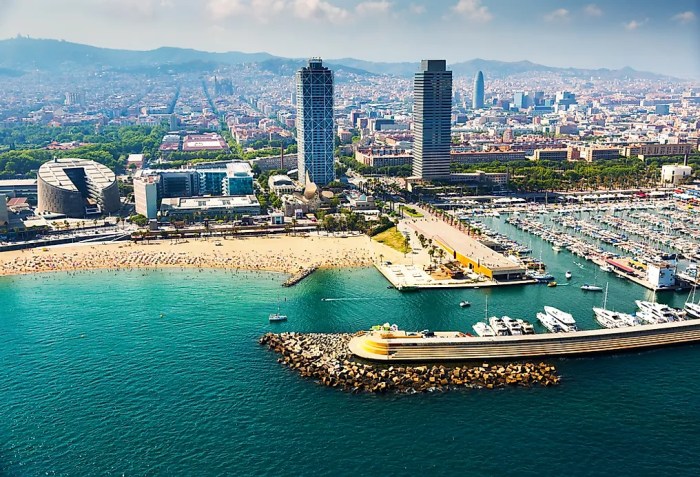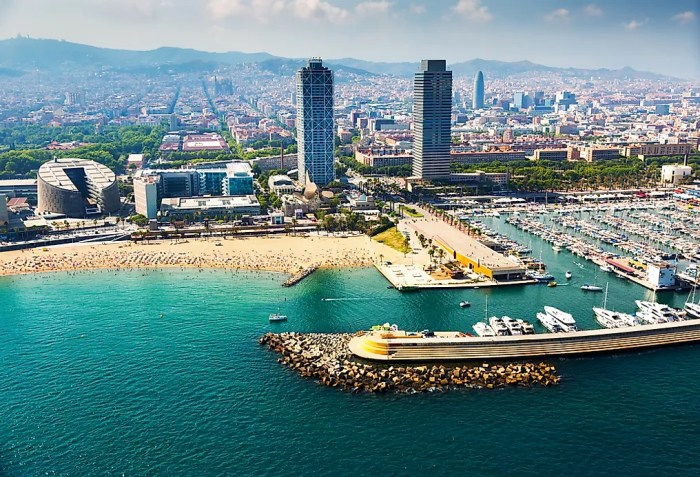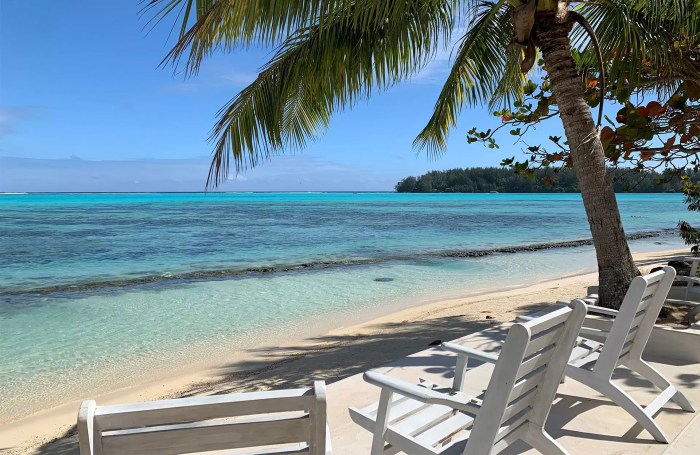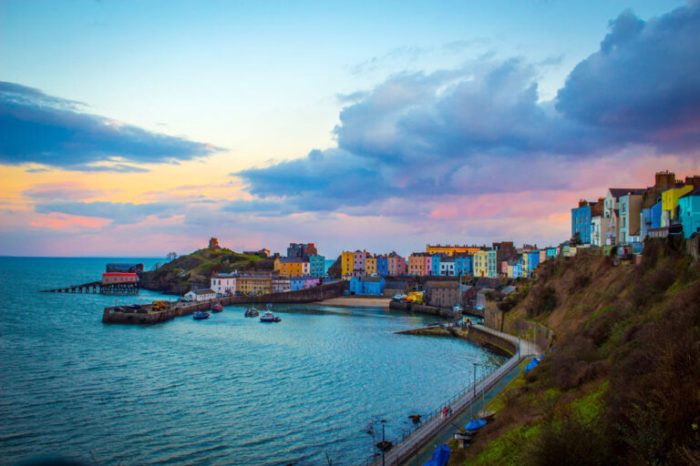Mediterranean ports, the gateways to the Mediterranean Sea, have played a pivotal role in shaping the history, economy, and culture of the region. From ancient times to the present day, these ports have served as hubs for trade, cultural exchange, and political power.
Today, Mediterranean ports continue to be vital economic centers, handling a vast array of cargo and facilitating global trade. They also serve as important tourist destinations, offering access to the region’s rich cultural heritage and natural beauty.
Port Infrastructure
Mediterranean ports boast a diverse range of infrastructure to cater to the varying needs of global trade. These facilities include:
- Container Terminals:Equipped with modern cranes and automated systems for efficient handling of containerized cargo.
- Bulk Cargo Terminals:Specialized facilities for handling dry bulk commodities such as grain, coal, and minerals.
- Liquid Cargo Terminals:Designed for the safe handling and storage of liquid cargoes like oil, gas, and chemicals.
- Ro-Ro Terminals:Dedicated to the loading and unloading of wheeled cargo, including vehicles, machinery, and equipment.
- Passenger Terminals:Modern and well-equipped facilities catering to the needs of cruise ship and ferry passengers.
Specialized Facilities and Equipment
Mediterranean ports have invested in specialized facilities and equipment to enhance their handling capabilities. These include:
- Super Post-Panamax Cranes:Capable of handling the largest container vessels.
- Automated Stacking Cranes:Used in container terminals to optimize yard operations.
- Ship-to-Shore Gantry Cranes:Designed for efficient loading and unloading of bulk cargo.
- Oil Storage Tanks:Massive tanks for storing and distributing liquid cargo.
- Ro-Ro Ramps:Facilitating the smooth movement of vehicles and machinery.
Role of Technology
Technology plays a vital role in modernizing port infrastructure. Advanced systems are being implemented to improve efficiency, safety, and sustainability:
- Port Management Systems:Centralized platforms for coordinating port operations and managing vessel traffic.
- Automated Gate Systems:Streamlining truck and container movements through automated gates.
- Radio Frequency Identification (RFID):Tracking cargo and equipment in real-time.
- Artificial Intelligence (AI):Optimizing yard operations and predicting vessel arrival times.
- Renewable Energy Sources:Reducing the environmental impact of port operations.
Cargo Handling
Mediterranean ports handle a diverse range of cargo, including containerized goods, bulk commodities, and specialized cargo such as vehicles, livestock, and perishable goods. Containerized cargo dominates the trade, accounting for over 70% of the total volume handled. Bulk commodities, such as grains, coal, and minerals, are also significant, while specialized cargo caters to specific industries and markets.The
processes and procedures involved in cargo handling are designed to ensure efficient and secure movement of goods. Loading and unloading operations are typically carried out using cranes, forklifts, and other specialized equipment. Cargo is carefully inspected and documented before being stored in warehouses or open yards.
Advanced technologies, such as automated systems and RFID tracking, are increasingly being adopted to enhance efficiency and reduce turnaround times.
Storage and Security
Mediterranean ports provide ample storage facilities for cargo, ranging from traditional warehouses to modern distribution centers. Storage conditions are carefully controlled to meet the specific requirements of different types of cargo. Security measures are also stringent, with access restricted and surveillance systems in place to prevent unauthorized access and theft.
Sustainability, Mediterranean ports
Sustainability is becoming an increasingly important consideration in cargo handling operations. Ports are implementing measures to reduce their environmental impact, such as using energy-efficient equipment, optimizing energy consumption, and promoting recycling and waste management practices.
Port Operations

Mediterranean ports play a vital role in the global supply chain, facilitating the efficient movement of goods and passengers. Their operations involve a complex interplay of various aspects, including vessel scheduling, traffic management, and safety measures.
Vessel scheduling is crucial to ensure the smooth flow of vessels in and out of ports. It involves coordinating the arrival and departure times of vessels, considering factors such as cargo handling capacity, berth availability, and tidal conditions. Effective traffic management is essential to prevent congestion and ensure the safe and efficient movement of vessels within the port area.
This includes managing vessel berthing, pilotage, and towage services.
Safety Measures
Safety is paramount in port operations, and Mediterranean ports implement stringent measures to minimize risks. These measures include regular inspections and maintenance of port infrastructure, adherence to international safety regulations, and the use of advanced technologies such as radar and vessel tracking systems.
Emergency response plans are also in place to deal with potential incidents.
Coordination Between Stakeholders
Port operations require close coordination between various stakeholders, including port authorities, shipping lines, cargo handlers, and customs officials. Effective communication and collaboration among these stakeholders are essential to ensure seamless and efficient operations. Port authorities play a central role in coordinating these activities, providing overall management and oversight.
Best Practices and Innovations
Mediterranean ports are constantly striving to improve their operations through the adoption of best practices and innovative technologies. These include the use of automated systems for cargo handling, digital platforms for vessel scheduling, and the implementation of smart port technologies for enhanced efficiency and safety.
Economic Impact: Mediterranean Ports
Mediterranean ports serve as vital economic hubs, driving growth and prosperity on local, regional, and global scales. Their strategic locations facilitate trade, tourism, and job creation, fostering economic development and improving the well-being of surrounding communities.
As gateways to international markets, Mediterranean ports play a crucial role in trade. They facilitate the import and export of goods, connecting businesses and consumers worldwide. The efficient movement of cargo through these ports contributes to economic growth by reducing transportation costs and enhancing competitiveness.
Trade
- Mediterranean ports handle a significant portion of global trade, with major commodities including energy, agricultural products, and manufactured goods.
- The presence of modern port infrastructure and efficient logistics systems enables the seamless flow of goods, supporting international supply chains.
- Port-centric trade zones and industrial parks attract businesses and investments, creating new economic opportunities.
Tourism
In addition to trade, Mediterranean ports are major tourist destinations. Cruise ships and ferries bring millions of visitors to coastal cities and islands, generating revenue for local businesses and creating jobs in the hospitality sector.
- Ports provide access to scenic attractions, historical sites, and cultural experiences.
- Tourist spending supports local economies, from restaurants and hotels to transportation and retail.
- Cruise lines often collaborate with local businesses to offer shore excursions and cultural tours.
Job Creation
Mediterranean ports are major employers, providing direct and indirect jobs in various sectors. The port industry creates opportunities in:
- Cargo handling and logistics
- Shipbuilding and repair
- Transportation and warehousing
- Customs and border control
The economic impact of Mediterranean ports extends beyond local communities. They contribute to regional development by providing essential infrastructure for trade and tourism. By connecting countries and cultures, ports foster economic integration and promote cross-border cooperation.
Numerous successful economic development initiatives are linked to port activities. For example, the Port of Barcelona has transformed itself into a thriving business hub, attracting investments and creating new industries. The Port of Rotterdam has implemented innovative sustainability practices, making it a model for green port development.
Connectivity and Accessibility
Mediterranean ports are strategically located at the crossroads of major global trade routes, providing seamless connectivity between Europe, Africa, and Asia. This connectivity is further enhanced by a comprehensive transportation network that includes highways, railways, and airports, facilitating the efficient movement of goods to and from ports.
The accessibility of Mediterranean ports varies depending on their size and infrastructure. Larger ports like Barcelona, Valencia, and Genoa can accommodate large container ships and tankers, while smaller ports are typically accessible to smaller vessels and specialized cargo. To improve accessibility, many ports are investing in infrastructure upgrades, such as deepening channels, expanding berths, and installing modern cargo handling equipment.
Partnerships and Collaborations
To enhance connectivity and accessibility, Mediterranean ports are actively forming partnerships and collaborations with other ports, shipping lines, and logistics providers. These partnerships aim to optimize supply chains, reduce transit times, and improve the overall efficiency of cargo movement. For example, the Port of Valencia has established a partnership with the Port of Shanghai, creating a direct shipping route between the two major trade hubs.
Environmental Considerations
Mediterranean ports play a vital role in global trade and transportation, but their operations can have a significant impact on the marine environment and coastal communities. Understanding and mitigating these environmental impacts is crucial for sustainable port development and management.
One of the main environmental concerns associated with Mediterranean ports is pollution, including air pollution from ship emissions and water pollution from discharges of wastewater, ballast water, and oil spills. These pollutants can harm marine ecosystems, damage coastal habitats, and pose risks to human health.
Regulations and Initiatives
To address these environmental concerns, various regulations and initiatives have been implemented at the national and international levels. The International Maritime Organization (IMO) has established regulations on air emissions, wastewater discharge, and ballast water management. The European Union has also adopted directives aimed at reducing pollution from ports, including the Port Reception Facilities Directive and the Environmental Impact Assessment Directive.
Sustainable Practices
In addition to regulations, many Mediterranean ports have adopted sustainable practices to reduce their environmental footprint. These practices include:
- Shore power supply: Providing electricity to ships while they are docked, reducing air pollution from ship generators.
- Wastewater treatment facilities: Treating wastewater before it is discharged into the marine environment, reducing water pollution.
- Ballast water management systems: Preventing the introduction of invasive species through ballast water discharge.
- Environmental monitoring programs: Monitoring air and water quality to assess the environmental impact of port operations and identify areas for improvement.
Historical Significance
The Mediterranean Sea has been a maritime crossroads for millennia, and its ports have played a vital role in shaping the region’s history, culture, and economy.
In ancient times, ports such as Tyre, Carthage, and Alexandria were major centers of trade and cultural exchange. These ports were the gateways to the Mediterranean world, connecting the cultures of Egypt, Greece, Rome, and beyond.
Trade and Cultural Exchange
Mediterranean ports facilitated the exchange of goods, ideas, and technologies between different cultures. The Phoenicians, for example, were renowned for their maritime skills and established trading colonies throughout the Mediterranean. They spread their alphabet, religion, and cultural practices to other regions.
The Greeks and Romans also played a significant role in the development of Mediterranean ports. They established colonies and trading posts along the coastlines, which became important centers of commerce and cultural exchange.
Political Power
The control of Mediterranean ports has often been a source of political power. In the Middle Ages, the Italian city-states of Venice, Genoa, and Pisa competed for control of the Mediterranean trade routes. These ports became wealthy and powerful, and their influence extended far beyond the Mediterranean region.
In the modern era, Mediterranean ports have continued to play a vital role in global trade and politics. Ports such as Marseille, Barcelona, and Istanbul are major hubs for shipping and commerce.
Iconic Ports
Some of the most iconic and historically important ports in the Mediterranean include:
- Tyre: An ancient Phoenician city-state, Tyre was a major center of trade and culture. It was conquered by Alexander the Great in 332 BC.
- Carthage: A powerful North African city-state, Carthage was a major rival of Rome. It was destroyed by the Romans in 146 BC.
- Alexandria: Founded by Alexander the Great in 331 BC, Alexandria became a major center of learning and culture. It was the home of the Great Library of Alexandria, one of the largest and most important libraries in the ancient world.
- Venice: A powerful maritime republic, Venice controlled much of the Mediterranean trade routes in the Middle Ages. It was a major center of art and culture, and its architecture is still admired today.
- Istanbul: Located at the crossroads of Europe and Asia, Istanbul has been a major port city for centuries. It was the capital of the Byzantine Empire and the Ottoman Empire.
Regional Cooperation
Regional cooperation among Mediterranean ports is crucial for enhancing their competitiveness and addressing common challenges. It fosters collaboration, sharing of best practices, and joint initiatives to optimize port operations and infrastructure development.
Various initiatives and organizations have been established to promote regional cooperation among Mediterranean ports. One notable example is the Mediterranean Ports Association (MEDports), which represents the interests of over 100 ports in the region. MEDports facilitates networking, knowledge sharing, and joint projects to improve port efficiency and sustainability.
Successful Regional Projects
Several successful regional projects have emerged from collaborative efforts among Mediterranean ports. One such project is the “MedPorts Information System” (MedPIS), which provides a platform for ports to share data on port performance, traffic flows, and environmental impact. MedPIS enhances transparency and enables ports to identify areas for improvement and collaboration.
Mediterranean ports have a rich history and culture, attracting visitors from around the world. For those planning a trip to London for New Year’s Eve, there are many hotels in london for new years eve to choose from. After exploring the bustling streets of London, travelers can return to the tranquility of Mediterranean ports, where they can relax and enjoy the beautiful scenery.
Future Trends
Mediterranean ports are poised to face a dynamic and evolving landscape in the coming years. Technological advancements, environmental regulations, and economic shifts will reshape port operations, requiring ports to adapt and innovate to meet future demands.
The rise of automation and digitalization will play a significant role in port operations. Automated systems, such as automated guided vehicles (AGVs) and remote-controlled cranes, will improve efficiency and reduce labor costs. Advanced data analytics and artificial intelligence (AI) will enable ports to optimize resource allocation, predict demand, and improve decision-making.
Environmental Sustainability
Environmental sustainability will remain a key priority for Mediterranean ports. Stricter regulations and consumer demand for environmentally friendly practices will drive ports to adopt greener technologies. Ports will invest in renewable energy sources, such as solar and wind power, to reduce their carbon footprint.
Electric and hybrid vehicles will become more prevalent in port operations, further reducing emissions.
Economic Shifts
Economic shifts, such as the rise of e-commerce and the relocation of manufacturing to Asia, will impact port operations. E-commerce will drive demand for smaller, more frequent shipments, while the relocation of manufacturing will lead to a shift in cargo types.
Ports will need to adapt their infrastructure and operations to handle these changing demands.
Adapting and Innovating
To meet future demands, Mediterranean ports will need to embrace innovation and adapt their operations. Ports will invest in research and development to explore new technologies and practices. They will collaborate with academia, industry partners, and government agencies to develop innovative solutions.
By adapting and innovating, Mediterranean ports can position themselves to remain competitive and meet the challenges of the future.
Closure
As the Mediterranean region continues to evolve, so too will its ports. Emerging trends and challenges, such as technological advancements, environmental regulations, and economic shifts, will shape the future of port operations. Mediterranean ports must adapt and innovate to meet these challenges and continue to serve as vital gateways to the region.
FAQ
What are the major types of cargo handled at Mediterranean ports?
Mediterranean ports handle a wide range of cargo, including containerized goods, bulk liquids, dry bulk commodities, and specialized cargo such as vehicles and perishable goods.
What are the key challenges facing Mediterranean ports?
Mediterranean ports face a number of challenges, including increasing competition from other global ports, the need to modernize infrastructure, and the need to reduce their environmental impact.
What are the future trends that will shape the development of Mediterranean ports?
Emerging trends that will shape the development of Mediterranean ports include the growth of e-commerce, the increasing use of automation and technology, and the need for ports to become more sustainable.



